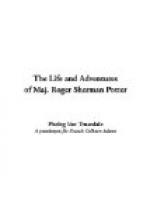(such as ragged politicians and wasted vagrants,) there
assembled. Having paused a few moments, (to the
great impatience of his shattered admirers,) that
the aldermen who accompanied him may quench their
thirst, he will alight amidst the huzzas of the throng
and ascend the platform, built for the occasion by
an enthusiastic carpenter. An ex-alderman, of
dogged deportment, whom the clamorous mob greet with
the title of judge, will welcome him in an address,
(he will read it by the light of a tallow candle, held
in the hand of a corpulent councilman,) written by
a well starved critic on the Times newspaper, and
for which service he (the said starved critic) was
promised five dollars. The hero will undoubtedly
take it for granted, that he is as great a general
as he is there set down; nor must he be amazed if
he find it written of him, that the noble deeds of
which he is the champion far outshine all that has
heretofore been set down in history. In fine,
he must receive each compliment with a gracious bow,
remembering that they are employed with the sincerity
so characteristic of our gravest politicians.
It being customary, I make no doubt the address will
be received with “deafening applause,”
though it were impossible those present could hear
one word of it. The reading will then conclude
with twenty thousand voices spontaneously calling
for the hero, who must rise with great gravity, and,
having surveyed the dilapidated throng, proceed to
respond in a speech of at least half an hour long.
While delivering himself of this speech, he must be
careful not to think of the gray haired fathers and
mourning orphans he has left to mingle their tears
over the devastation he inflicted upon their country,
lest it damage his rhetoric. But he must declare
that he is overwhelmed with the honors thus showered
upon him by an assemblage so respectable. Of
course he will not forget to mention, that his emotions
have quite deprived him of the power, even if he had
the capacity, of expressing his gratitude for this
very unexpected manifestation of their approbation.
And this peroration he must end, with complimenting
the virtue and discretion, the self sacrificing devotion,
and the high purposes of the motley assemblage, who
are meanwhile getting up numerous fights for their
more immediate amusement.
The drummers and fifer having refreshed themselves, the hero must be got carefully into the carriage by his generals and adjutant generals in waiting, when the four lean horses, who were comforted with oats during the delivery of the speeches, will draw him up Broadway to the tune of “The dead I left behind me!” It being after nightfall, when the balconies of heaven are filled with black, warlike clouds, it will be necessary that the train proceed with torchlights, which are an essential part of the ovation to all great heroes. These generally consist of thirteen lighted tallow candles and two transparencies, in the manufacture of which six shillings




